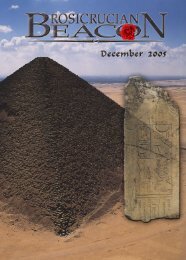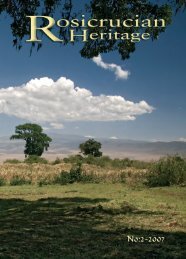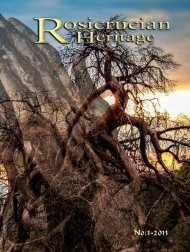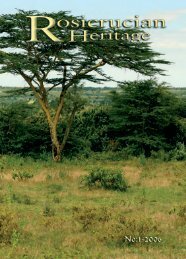Rosicrucian Beacon Magazine - 2010-09 - AMORC
Rosicrucian Beacon Magazine - 2010-09 - AMORC
Rosicrucian Beacon Magazine - 2010-09 - AMORC
Create successful ePaper yourself
Turn your PDF publications into a flip-book with our unique Google optimized e-Paper software.
There is no question of any new religion having been promulgated in Eleusis;<br />
this can be ruled out because the initiates, when they returned to their<br />
homelands after the Mysteries, remained faithful to their native religions.<br />
Separation of Individual and Environment<br />
The great importance and long duration of the Mysteries<br />
indicate that they answered a profound spiritual necessity,<br />
a yearning of the soul. If we adopt the viewpoint of<br />
Nietzsche, the Greek spirit was characterised by a<br />
consciousness of reality divided from its origin. Greece<br />
was the cradle of an experience of reality in which the<br />
ego felt itself separated from the exterior world. Here,<br />
the conscious separation of the individual from the<br />
environment developed earlier than in other cultures. This<br />
dualistic world view, which the German physician and<br />
writer Gottfried Benn has characterised as the European<br />
destiny neurosis, has figured decisively in the course of<br />
European spiritual history, and is still fully operative in<br />
the Western world.<br />
An ego that is capable of confronting the exterior<br />
world and of regarding the world objectively as matter,<br />
a spirit capable of objectivising the external<br />
world, was a precondition for the appearance of<br />
Western scientific research. This objective world<br />
view is evident even in the earliest documents of<br />
scientific thought, in the cosmological theories<br />
of the Greek pre-Socratic philosophers. The<br />
perspective of man in opposition to nature, which has<br />
made possible a vigorous domination of nature, was given<br />
its first clear philosophical formulation by Descartes<br />
in the 17 th century. In Europe therefore, a wholly<br />
objective, quantitative scientific investigation of nature<br />
has developed which has made it possible to explain the<br />
physical and chemical laws of the composition of the<br />
material world. Its findings also made possible a hitherto<br />
nonexistent exploitation of nature and her forces.<br />
It has led to the industrialisation and technification<br />
of nearly all aspects of modern life. It has brought a small<br />
portion of humankind a level of comfort and material<br />
well-being hitherto scarcely imaginable. It has also<br />
resulted in the catastrophic destruction of the natural<br />
environment, and now has produced a global ecological<br />
crisis.<br />
Even more serious than the material consequences<br />
is the spiritual damage of this evolution, which has led<br />
to a materialistic world view. The individual has lost<br />
the connection with the spiritual and divine ground of<br />
all being. Unprotected, without shelter, and alone with<br />
oneself, the human individual confronts in solitude a<br />
soulless, chaotic, materialistic and menacing universe. The<br />
seeds of this dualistic world view, which has manifested<br />
itself so catastrophically in our time, were, as previously<br />
mentioned, already evident in Greek antiquity. The Greek<br />
genius sought the cure, so that the external, material world,<br />
under Apollo’s protection, could be seen in its sublime<br />
beauty. The colourful, joyous, sensual, but also painful<br />
Apollonian world was complemented by the Dionysian<br />
world of experience, in which the subject was dissolved<br />
in ecstatic inebriation.<br />
Nietzsche wrote of the Dionysian world view in The<br />
Birth of Tragedy (1872):<br />
It is either through the influence of narcotic potions,<br />
of which all primitive peoples and races speak in hymns,<br />
or through the powerful approach of spring, penetrating<br />
all of nature with joy, that those Dionysian stirrings arise,<br />
which in their intensification lead the individual to forget<br />
himself completely… Not only does the bond between person<br />
and person come to be forged once again by the magic of the<br />
Dionysian rite, but alienated, hostile, or subjugated nature<br />
again celebrates her reconciliation with her prodigal son,<br />
mankind.<br />
The Eleusinian Mysteries were closely connected<br />
with the rites and festivities in honour of the god<br />
Is it defensible to use consciousness-altering drugs<br />
under specific circumstances to gain new insights<br />
into the spiritual world.<br />
Dionysus. They led essentially to healing , to the<br />
transcendence of the division between humankind and<br />
nature; one might say to the abolition of the separation<br />
between creator and creation. This was the real, greater<br />
proposition of the Eleusinian Mysteries. Their historical,<br />
cultural significance, their influence on European spiritual<br />
history, can scarcely be overestimated. Here, suffering<br />
humanity, split by its rational, objective spirit, found<br />
healing in a mystical experience of totality that made it<br />
possible for the individual to believe in the immortality<br />
of an eternal being.<br />
36<br />
The <strong>Rosicrucian</strong> <strong>Beacon</strong> -- September <strong>2010</strong>











